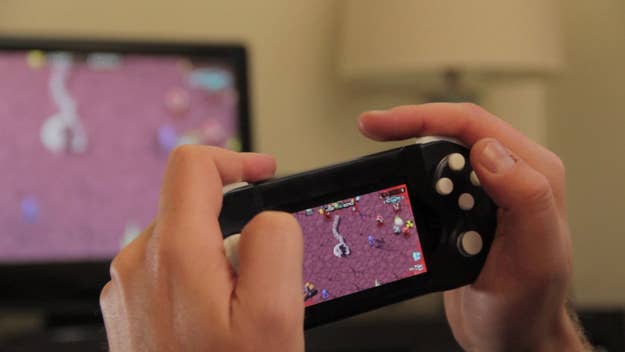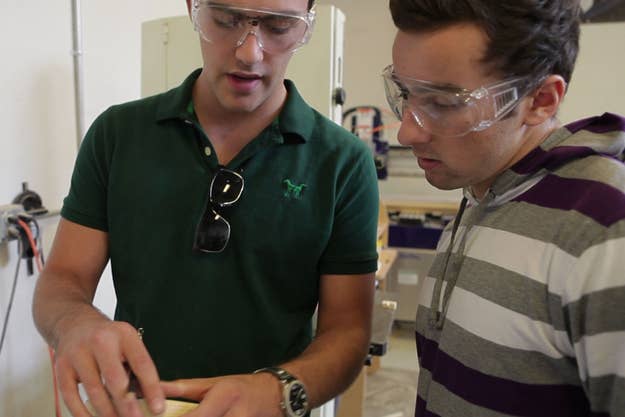
By the time Connor Zwick had successfully applied to become one of libertarian investor icon Peter Thiel's famed fellows, he was already strikingly successful: When he was 13, he had been tearing apart computers for years, and Australian-based tech site Nettuts.com tried to hire him as a writer, not realizing his age. In his senior year of high school, he built a study aid app, Flashcards+, which has had almost a million downloads.
Zwick, now 19, thinks that app helped him get into Harvard, as well as into the startup incubator Y Combinator. He got an acceptance call from the university the day after his interview. "They said that was very rare," he says, straight-faced.
Now, Zwick and business partner Colton Gyulay are taking his latest concept, the Coco Controller, a mobile controller that slides over smart phones, to the marketplace. Via Kickstarter, of course. It's easy to see the appeal: While many games have been successfully adapted to the touch screen, many others, like first-person shooters, are an exercise in knuckle-busting frustration with touch controls.

Zwick is not the first to attempt to bring such a product to market: many have tried and failed, and it's been rumored that Apple is working on its own game controller for the iPhone. The features that Zwick champions are the fact that his device interfaces with the phone using the audio port, not Bluetooth, giving it a simpler more elegant design than what's already out there. (By using the audio port, like the Square card readers do, Zwick can keep electronics components to a minimum and ensure compatibility with multiple phones.) Also, by setting the price at $35, Zwick thinks he can interest the most casual of casual gamers. So far, 31 companies have signed on to make their games work with the Coco controller, and Zwick promises that Coco is are talking to many more.
"None of the previous attempts have gotten the successful games," he says. "We have 30 games and around ten of them have been the most popular games. We're also talking to big studios. By the time people have these in their hands, there will be hundreds, if not thousands of games that work with this."
Why would a guy as well-connected as Zwick need to raise money on Kickstarter? For hardware, he says, it's especially important to be able to reach scale: By setting the Kickstarter goal at $175,000, they would ensure that they'd be able to keep unit costs down. Also, for a fledging company, the publicity garnered by a successful Kickstarter, versus a round of VC funding, would be extremely helpful. (Not that Zwick really hurts for publicity: a New York Times reporter shadowed him while they were filming the Kickstarter video and he let it drop that another national publication was also planning a story.)
Zwick readily admits that this project isn't really the world-changing stuff that most Thiel fellows are working on. The fellowship has lofty stated goals: Thiel gives 20 young people under 20 $100,000 for two years, with the goal of separating them from higher education, at least temporarily, to try their hands at entrepreneurship and "explore new frontiers, experience the setbacks and successes of entrepreneurial pursuits, and begin changing the world one idea at a time."
But there are some bigger ideas behind the Coco: Zwick thinks that hardware is going to be the next wave of start-ups, subsuming the current interest in software apps. (Not everyone agrees on this point.) "This is a first product, and we want to do more. We want to develop fundamentally new technology and the only way to do that at my age is to do something that is commercially viable," he says.
Leaning back into the couch of a Starbucks in Palo Alto, Zwick seems incredibly relaxed for a guy launching his first public Kickstarter. He has the assurance, to paraphrase Joan Didion, of someone for whom the lights had always turned green. While he protests that he is "too busy" to have a girlfriend, his smile suggested that it isn't all work for him.
Last weekend, for instance, he hung out in the house that Mark Zuckerberg rented for his first summer in Palo Alto, made famous in The Social Network for the zipline. With the entreés to Silicon Valley afforded him by membership in Y Combinator and Thiel's world, Zwick says that he imagines sticking around the Bay Area for a while; he says it's a tough decision whether he will return to Harvard. This isn't his first go-round in the Bay Area business world, either. Last summer, a company wanted to invest in his Flashcards app. He declined ("I'm 17; I don't want the responsibility") but the company flew him out for the summer anyways, setting him up with a developer team and asking him to weigh in on other mobile products. "It was kinda weird," he says, grinning. "I don't know why they did it."
If it was weird for him, imagine how it felt for the developers, all of whom Zwick says were at least 30. But this is the world we live in now. "People my age are all over. People are getting in trouble. People are having a good time. There are alot of people in this area who are working at Facebook or Google as an intern, who are probably the closest to what I'm doing." he says. Most of the people that Zwick runs with, though, are older than him. "More like 21."

